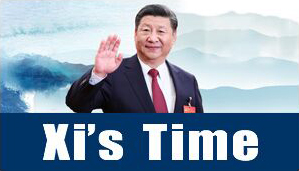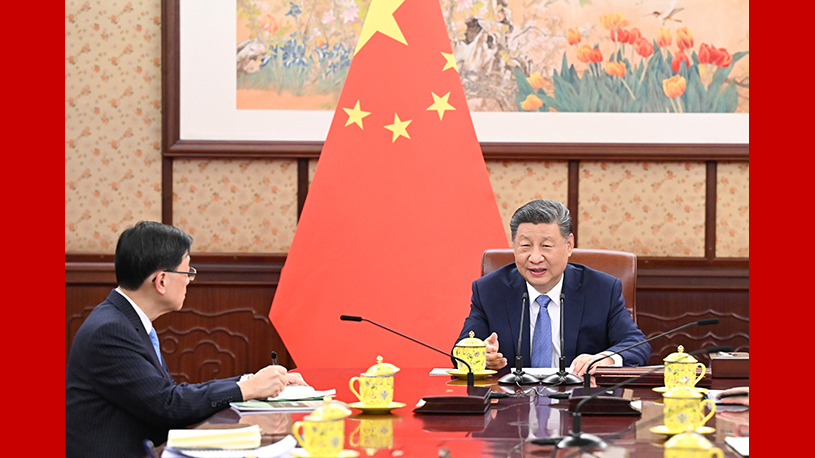Putting tariffs on China will not create many if any U.S. jobs, and could well result in net job losses in the United States through a loss of competitiveness, said Sachs. The better way to help the lagging U.S. Midwest is through regional development policies in the United States and other social outlays, such as job retraining.
by Xinhua writer Yang Shilong
NEW YORK, Dec. 15 (Xinhua) -- In interviews with Xinhua after Chinese President Xi Jinping sent a congratulatory letter to the 2024 gala dinner of the U.S.-China Business Council (USCBC), experts said the United States and China should seize opportunities to have dialogue and cooperation amid ongoing tensions.
In the congratulatory letter sent on Wednesday, Xi said China and the United States should choose dialogue over confrontation, and win-win cooperation over zero-sum games.
Noting that the China-U.S. relationship is one of the most important relationships in the world, Xi said it concerns not only the immediate interests of the Chinese and American peoples, but also the future of and destiny of the entire humanity.
The success of one side should be an opportunity rather than a challenge for the other, and one's achievement should help rather than hinder the development of the other, he added.
ARGUMENTS FOR U.S. PROTECTIONISM "DEEPLY MISPLACED"
Jeffrey Sachs, a renowned U.S. economist and professor at Columbia University, described Xi's remarks as "very wise" and hoped that Washington would heed them.
"President Xi's words are very wise, and I hope they are not in vain," said Sachs, criticizing the United States for adopting protectionist policies.
According to Sachs, the United States has become protectionist for three reasons: First, it has worked politically to blame job loss in manufacturing in the U.S. Midwest on China. The U.S. Midwest states have been the "swing states" in presidential elections, so both parties have turned protectionist.
Second, the United States aims to use protectionism as an industrial policy to create U.S.-based industries in green and digital technologies that lag behind China's.
Third, the United States aims to use protectionism to hinder China's rise in a zero-sum strategy to bolster U.S. hegemony.
All three arguments for U.S. protectionism are "deeply misplaced," said Sachs.
"The United States has benefited enormously from trade with China. To create an artificial tariff wall against trade with China will be a losing proposition," he said. "The main source of job decline is technology, not trade."
Putting tariffs on China will not create many if any U.S. jobs, and could well result in net job losses in the United States through a loss of competitiveness, said Sachs. The better way to help the lagging U.S. Midwest is through regional development policies in the United States and other social outlays, such as job retraining.
"The U.S. industrial policy for green and digital technologies should not aim against China. Indeed, Chinese companies can and should be part of successful U.S.-based industries," he added.
"The U.S. idea of hindering China's economic rise is profoundly misguided and dangerous, introducing a mistaken zero-sum mentality into a positive-sum relationship," said Sachs.
SEEK A WAY FORWARD
Despite ongoing challenges, U.S.-China relations remain the most critical bilateral relationship in the world, said Mitchell Presnick, a visiting fellow of practice at the Fairbank Center for Chinese Studies at Harvard University and founder of Super 8 Hotels China. He emphasized that both nations recognize pragmatic reasons to keep avenues for cooperation open.
"We've seen President Xi make significant efforts over the past year to engage the American business community," Presnick noted, citing key events such as the APEC Summit in San Francisco in November 2023 and the China Development Forum in Beijing in March 2024.
Beneath the rhetoric of conflict and competition, "both sides are searching for a way forward that better serves each country's interests," said Presnick.
"There are plenty of ways in which the United States and China could, if they choose to, improve their commercial relationship, and by so doing, improve U.S.-China relations," said Robert Kapp, former president of the USCBC.
Greg Cusack, a former Iowa state legislator, echoed the sentiments, calling for immediate steps to de-escalate tensions.
"How I wish we would try to seize upon such words and seek to interpret them as positively as possible to initiate that dialogue without which anything else will be difficult," said Cusack, referring to the messages delivered by Xi and U.S. President Joe Biden to the USCBC event.
"RADICAL DECOUPLING" UNREALISTIC, DAMAGING
Michael Swaine, a senior research fellow at the Quincy Institute for Responsible Statecraft, dismissed the idea of "radical decoupling" as unrealistic and damaging.
"It's obvious to most people who look at this problem clearly and seriously, that you cannot cut ties economically between the United States and China without harming both countries severely," said Swaine.
"So this whole notion of decoupling, radical decoupling, I think, is kind of a red herring. I don't think it's likely to happen. There'll be huge amounts of resistance in the business community and even among some politicians."
Swaine called for increased communication to prevent crises from escalating into conflicts, emphasizing the need for mutual understanding and trust.
"We want to have more communication," he said.
(Xinhua correspondents Liu Yanan in New York, Xiong Maoling and Deng Xianlai in Washington D.C. contributed to the story)■





